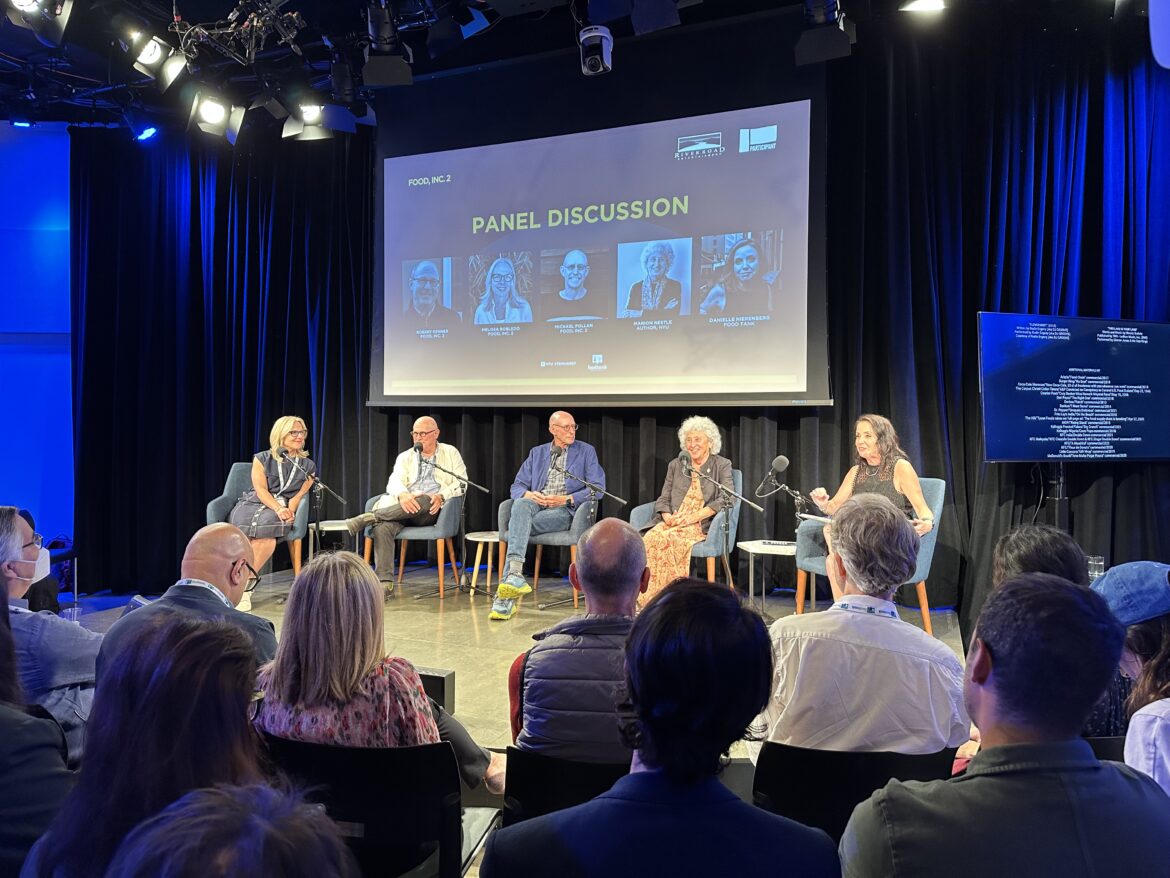Fifteen years after the critically acclaimed documentary Food Inc. debuted in 2008, Food Inc. 2 takes viewers on a journey that uncovers the hidden injustices lurking within our food system: chaos at supermarkets; Farmers burying their crops; supply chains breaking down; livestock being euthanized en-masse. The film premiered at Food Tank’s Food and Agriculture as a Solution to the Climate Crisis event on September 14, 2023. It was followed by a thought-provoking panel discussion on the urgent need to transform our food with co-directors Robert Kenner and Melissa Robledo and authors Marion Nestle and Michael Pollan, moderated by Food Tank President and Co-Founder, Danielle Nierenberg.
Unveiling Injustices:
The film begins in Immokalee, Florida, a place where migrant Latino and Haitian workers are lied to about their working conditions and wages. It sheds light on the stark contrast between the importance of eating healthy food and the lack of protections for the workers who produce it. Particularly shocking is how, during the COVID-19 pandemic, these workers were treated as disposable, with no clear policies to protect their health.
The Tyson Meatpacking Plant and COVID-19:
The narrative pivots from Florida to Waterloo, Iowa, where contact-tracing for COVID-19 focuses on the Tyson meatpacking plant as a major transmission hotspot. Workers were forced to process and pack meat elbow-to-elbow, resulting in a staggering 1,300 positive cases among 2,100 employees. This outbreak had devastating consequences, leading to a surge in deaths in the region. Notably, John Tyson’s alarming article about a potential meat shortage reached the president’s desk, prompting orders to ensure that the plants kept running.
Antitrust Enforcement and Monopolies:
The film underscores antitrust enforcement’s vital role in preserving competition and preventing monopolies. Antitrust laws ensure fair market dynamics in industries like food, safeguarding consumers and competitors from harmful domination. The film cites real-world examples of the consequences of flawed antitrust enforcement in the food industry, specifically that the four largest beef companies – Cargill, Tyson, JBS, and National Beef Packing – now control more than 80 percent of the market, due to unchecked acquisitions. Additionally, the film points out that the lack of antitrust enforcement and consolidation in the infant formula industry lead to nation-wide shortages following the 2022 Abbott recall.
Dairy Farming Crisis:
The documentary then takes us to Wisconsin, where dairy farmers are facing an ongoing crisis resulting from plummeting prices. As the film points out, overproduction, encouraged by banks, has led to a glut in the market. In addition, there are fewer processors because many have merged, and some dairies are moving to areas with fewer regulations and lower costs in warmer southwestern climates like New Mexico and Arizona, even though it exacts significant environmental tolls on energy use and contributes to the drought crisis.
The Cost of Ultra-Processed Foods:
Another alarming revelation is the detrimental impact of ultra-processed foods on human health. These products, loaded with sugar, salt, and fat, have been driving diet-related diseases. The film presented research from the National Institutes of Health (NIH), finding that people eating ultra-processed foods consume 500 more calories per day than those who consume unprocessed foods, predicting a weight gain of one pound per week. These foods, designed to be addictive and conveniently consumed in excess, are contributing to a global health crisis.
The Exploitation of Fast Food Workers:
The film also delves into the struggles of fast-food workers at chain restaurants like McDonalds and Taco Bell, predominantly women, who find it increasingly challenging to survive. It underscores the danger, greed, and cruelty of the exploitative working conditions that workers in the fast-food industry endure, despite being labeled “essential workers” during the Covid-19 pandemic.
Alternative Meat and Hope for Change:
Food Inc. 2 explores innovative solutions, such as genetically engineered alternatives like the Impossible Burger. While these alternatives offer promise, they come with their own set of challenges and potential drawbacks, including the high cost of production and skepticism about the ultra processed nature of certain meat alternatives.
Policy Changes and the Call to Action:
Throughout the film, a common thread emerges: the urgent need for policy changes. It’s imperative that government subsidies shift from supporting food companies to bolstering healthy policies that benefit citizens and the planet. Minimum wage, a universal basic income, and healthcare reform are among the critical issues intertwined with our food system.
Panel Discussion Highlights:
The panel discussion following the screening provided valuable insights. The filmmakers revealed that they had never anticipated making a sequel, but the pandemic unveiled the deeper issues within our food system. Food Inc. 2 focuses on the politics of the food industry, which differs from the first film’s exploration of the system itself. Authors Marion Nestle and Michael Pollan, both featured in the film, note the rise of the “citizen eater,” as more individuals make food choices aligned with their values. Momentum is building around advocating for food and farm worker rights.
Food Inc. 2 serves as a wake-up call, a compelling reminder that our food system requires immediate and comprehensive reform. The film not only exposes the harsh realities of our current food industry but also offers hope through potential solutions and calls to action. As citizens, we must become food activists and advocates, striving for social change. Policy shifts, especially in the Farm Bill, can significantly impact the food system, leading us toward a healthier, more equitable and sustainable future. A more resilient food system holds the key to addressing pressing issues like climate change and public health. This film, and the powerful discussion that accompanies it, leave us with a profound message: It’s time to cultivate a food system that heals both our bodies and our planet.


